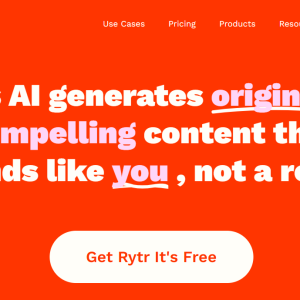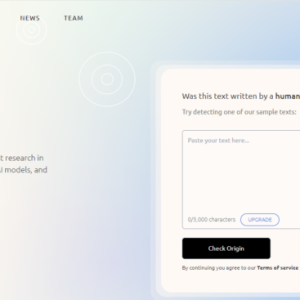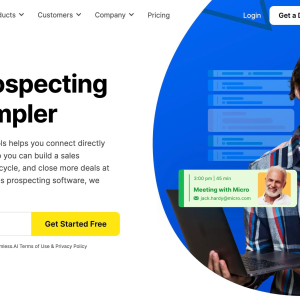In today’s highly digitized world, businesses and marketers are constantly seeking innovative ways to stay ahead of the curve and reach their target audience effectively. Artificial Intelligence (AI) has emerged as a game-changing technology that offers immense potential for online businesses and marketing strategies. With its ability to analyze vast amounts of data, automate processes, and provide personalized experiences, AI has revolutionized the way businesses interact with their customers. In this article, we will explore ten clever AI use cases that can significantly enhance online businesses and meet the ever-evolving marketing needs of the digital age. From chatbots and virtual assistants to predictive analytics and personalized recommendations, AI presents a myriad of opportunities for businesses to thrive in the competitive online landscape.
- How to Go About Scaling AI in Your Organization
- The Benefits and Dangers of Having AI Chatbots Interacting With Your Customers
- Hypotenuse AI Review: Is This The Best AI Writing Assistant?
- Crawlq Review: Can It Really Produce 100% Unique Personalized Content?
- Free AI Content Generator: Free Tools and Trials to Generate Articles
As a niche business owner, entrepreneur, or side hustler, you’re no stranger to the challenges of carving out your path. Navigating these challenges requires innovative tools. And especially nowadays, artificial intelligence use cases offer exciting possibilities.
You are viewing: 10 Clever Artificial Intelligence Use Cases For Your Online Businesses and Marketing Needs
Think about how AI can facilitate your marketing efforts, for example. Instead of offering a general approach to your audience, you can use the wealth of data available in the digital realm to refine your messages and target specific customers.
Or, imagine how AI could streamline your internal processes. By automating time-consuming and mundane tasks, you can focus on more meaningful work that drives your business forward.
And the best part? AI technologies are becoming more accessible and affordable, making it possible for small businesses to harness their power.
These 10 artificial use cases are specifically tailored for online businesses and marketing, offering you a glimpse into the future of digital entrepreneurship.
10 Powerful Artificial Intelligence Use Cases
Let’s explore the multifaceted ways in which artificial intelligence is transforming the landscape of online business and marketing:
1. Chatbots for E-commerce

If you run an e-commerce business, artificial intelligence use cases are plentiful. A standout example is the application of chatbots, specifically tools like Landbot. This AI-powered tool can revolutionize your customer interactions, functioning as a round-the-clock virtual sales assistant.
Here are some of the most helpful use cases of chatbots for e-commerce:
- Personalized Interaction: The chatbot greets customers personally, using their purchase history for a tailored approach.
- Customer Service: It answers queries, improving customer service and satisfaction levels.
- Product Recommendations: The bot suggests products based on past purchases, mimicking an in-store sales assistant.
- Task Automation: It can handle repetitive tasks like data entry, freeing up your time to focus on strategic decisions.
These AI-powered virtual assistants utilize machine learning and natural language processing to understand and respond to customer inquiries.
These chatbots can also be used to compile valuable customer data for future marketing campaigns. So, not only do these chatbots improve customer satisfaction, but they also collect valuable data for future marketing campaigns.
2. AI in Email Marketing

AI tools are transforming email marketing for entrepreneurs, offering personalized content, optimized scheduling, and predictive recommendations. Gone are the days of manually segmenting your email list and sending generic emails to everyone.
Instead, artificial intelligence email marketing programs offer:
- Personalized Content: If you run an online clothing store, AI can tailor emails to showcase summer dresses to customers who frequently buy them.
- Optimized Send Times: AI analyzes when customers are most likely to read emails and sends your marketing emails at those times.
- Predictive Recommendations: For a customer who has recently bought a camera from your store, AI can suggest they buy a compatible lens or tripod next.
You can automate these processes by integrating artificial intelligence use cases with your email platform. Popular programs like AWeber improve customer engagement and save time, making your email marketing strategy more efficient and effective.
3. Predictive Analysis in SEO

If you’re a business owner, marketer, or content creator, predictive analysis in SEO can significantly improve your strategy. AI-powered SEO tools like Surfer SEO and Link Whisper use machine learning algorithms to analyze big data, including historical data on your site and in your niche.
It may sound like a complicated concept, but it’s quite straightforward. SEO tools like Surfer or Frase analyze keywords, content structure, and backlinks to determine the factors that lead to high search engine rankings for specific topics.
You can even get artificial intelligence certification from a company like Surfer SEO to ensure you’re using their product as effectively as possible.
Here’s how it benefits you:
- Sales Forecasting: By understanding market trends, these AI applications help you anticipate which products will be popular, optimizing your marketing campaigns.
- Traffic Optimization: Some AI-based tools can suggest the best times for posting content or launching promotions by analyzing customer traffic data.
- Keyword optimization: They highlight the most relevant keywords for your content to rank higher on search engines.
See more : Notion AI vs ChatGPT: Which of These Powerful AI Tools is Best for You
AI intelligent systems not only improve customer satisfaction but also frees you from repetitive tasks, allowing you to focus on decision-making and serving customers better.
And the best part is that these AI solutions are simple to set up: sign up, connect your website, and let the AI handle the rest.
4. Personalized Shopping Experiences

Imagine you’re a small business owner running an online clothing store. You want to make your customers’ shopping experience more personalized. However, sifting through customer data and tailoring offerings manually is time-consuming. Here’s where artificial intelligence in retail business comes in.
AI tools, powered by machine learning algorithms, analyze historical sales data and customer reviews to understand each customer’s preferences.
For instance, if customers frequently buy summer dresses, the AI system will recognize this pattern and suggest similar dresses in future communications.
And these aren’t brand-new features. The popular program Shopify, for example, offers intelligent product recommendations to help customers find their perfect fit.
Here are a few ways AI solutions can improve the e-commerce experience:
- Improved Customer Service: AI in an online bookstore analyzes customer data to offer personalized book recommendations, enhancing the user experience.
- Optimized Business Processes: A fashion retailer uses AI for automating data analysis, saving time for strategic planning like campaign designing.
- Chatbot Support: As mentioned above, chatbots improve customer service by answering queries and offering real-time support.
- Cart Abandonment Prevention: AI tools can detect when a customer is about to abandon their cart and send personalized messages to remind them or offer discounts.
In all these examples, AI improves the user experience and benefits the business by saving time and boosting sales. Whether it’s an online bookstore, a small fashion retailer, or a music streaming service, any business can leverage AI to deliver personalized recommendations and reap these benefits.
5. Intelligent Supply Chain Management

Intelligent Supply Chain Management, when powered by AI, is a transformative tool for business owners, particularly in industries with complex logistics.
If you’re moving a product from one place to another, there are countless factors to consider: weather conditions, traffic delays, transportation costs, etc.
AI-powered supply chain management tools can analyze data from various sources and offer recommendations based on real-time conditions, optimizing your supply chain operations.
You can expect the following artificial intelligence use cases:
- Inventory Management: Let’s say you run a niche business selling artisanal cheeses. An AI solution can analyze historical data, market trends, and even customer reviews to predict which cheese varieties will be in high demand, helping you manage your stock efficiently.
- Supply Chain Optimization: AI applications can scrutinize your entire supply chain, from milk procurement to customer delivery, identifying bottlenecks. For instance, it might find that your cooling transport isn’t optimal for certain cheeses, leading to quality control issues.
Setting up involves integrating the AI system into your business processes. This not only enhances customer satisfaction but also streamlines your administrative tasks. So, put AI to work in your business today, make data-driven decisions, and gain access to the benefits of advanced analytics.
6. AI for Lead Generation and Outreach

AI for lead generation and outreach is a boon for marketers, salespeople, and business owners seeking to grow their customer base. AI-powered solutions use machine learning and natural language processing to analyze data and generate leads.
Here’s how it increases your business value:
- Data Analytics: Suppose you sell eco-friendly products. AI can analyze customer reviews and social media sentiment to identify potential customers who are passionate about sustainability.
- Marketing Campaign Optimization: AI systems can also analyze historical data and market trends to determine the best time and channel for outreach.
Setting up involves integrating the AI application with your CRM or marketing software. This improves customer experience by targeting relevant leads and saves time on manual lead generation. This makes it a breeze to enhance your decision-making capabilities with predictive analytics.
7. Fraud Detection and Prevention in Online Transactions

Protecting your business from online fraud can be a daunting task. But don’t worry; AI-powered fraud detection and prevention have been steadily evolving. Especially useful for financial institutions and businesses managing digital transactions, this technology uses machine learning to analyze historical data and detect suspicious patterns.
However, even a small to mid-sized business can use AI to mitigate risk factors. SaaS programs like SEON, Riskified, and Signifyd offer fairly affordable solutions.
See more : Using Chatbots and Generative AI for Sales Growth
For instance, if you run an e-commerce business, the AI can alert you about unusual buying behavior, like large orders from a new account. It can even block these potentially fraudulent transactions, enhancing your data security and building customer trust.
It can also help you with customer identity verification, reducing the chances of fraud and chargebacks. Setting it up involves integrating an AI solution into your website or payment processing system, giving you peace of mind as you focus on growing your business.
8. Customer Service Personalization

Imagine walking into your favorite store, and the salesperson already knows your style, preferences, and budget. That’s what AI-powered customer service personalization can do for your business online.
This use case of artificial intelligence utilizes machine learning and natural language processing to analyze big data from customer interactions. It understands customer behavior through data points and uses sentiment analysis to measure customer satisfaction.
For instance, an online retailer can use such AI solutions to tailor marketing campaigns, enhancing customer experience and boosting sales.
Setting up AI personalization involves
- Integrate an AI system with your data warehouse.
- Allow the system to analyze market trends and customer data.
- Use the insights to personalize your services or products.
A program like IBM’s Watson Assistant can help you achieve this level of personalization and customer satisfaction. IBM’s Watson Assistant uses machine learning algorithms to analyze customer data and understand their preferences.
It then leverages this information to provide personalized product recommendations, responses, or services, enhancing strategic decision-making.
9. Content Creation with AI

With the explosion of automated writing software becoming accessible to business owners of all sizes and budgets, content creation has become one of the world’s most popular artificial intelligence use cases.
From using ChatGPT for research to nailing the tone of your next press release, AI-powered solutions are becoming increasingly popular for creating content that resonates with your target audience.
Here are a few common use cases for AI-powered content creation:
- News Articles and Blog Posts: Many news outlets and online publications use AI-generated articles to cover basic stories, saving time and resources for their staff writers.
- Product Descriptions: E-commerce businesses can use AI writing software like Jasper.ai to generate product descriptions that are tailored to their target audience.
- Email Marketing and Social Media Posts: With the help of machine learning algorithms, AI writing software can analyze customer data to generate personalized email marketing campaigns or social media posts that resonate with your target audience.
Integrating an AI content creation tool into your business processes can save time and resources while enhancing the quality of your content. Plus, it allows for scalability and consistency in your content creation efforts.
10. Personalized Marketing Campaigns

Personalized marketing campaigns can significantly elevate your business. By leveraging AI and machine learning, these campaigns analyze customer data to create tailored strategies that resonate with your audience.
Key artificial intelligence use cases include:
- Crafting targeted email campaigns: These AI campaigns can segment your customer base, sending personalized emails based on their preferences and behaviors.
- Creating personalized social media content: AI analyzes social media interactions, creating content that matches users’ interests.
- Automating customer service responses: Marketing AI software can provide personalized responses to common queries, enhancing the customer experience.
A tool like HubSpot shines in this domain. It integrates easily with your systems, begins data analysis, and optimizes your marketing efforts. This results in improved customer experiences and business growth.
Final Thoughts: 10 Artificial Intelligence Use Cases for Online Business and Marketing
Artificial intelligence use cases are no longer a futuristic concept – they’re a very helpful opportunity in the present.
As we move forward, the potential of AI in niche business-building is boundless.
As AI advances, it blurs the lines between technology and human interaction, making the customer experience more intuitive and engaging. And they are revolutionizing the way businesses interact with customers, offering a level of personalization previously unimaginable. So make sure you take advantage of it!
That concludes the article: 10 Clever Artificial Intelligence Use Cases For Your Online Businesses and Marketing Needs
I hope this article has provided you with valuable knowledge. If you find it useful, feel free to leave a comment and recommend our website!
Click here to read other interesting articles: AI
Source: guidelisters.com
#Clever #Artificial #Intelligence #Cases #Online #Businesses #Marketing
Source: https://guidelisters.com
Category: AI





